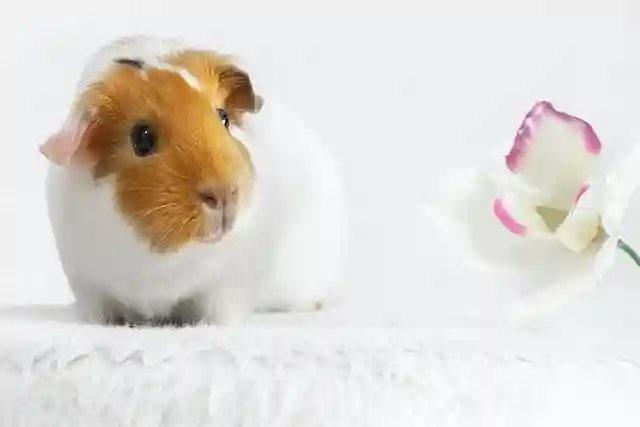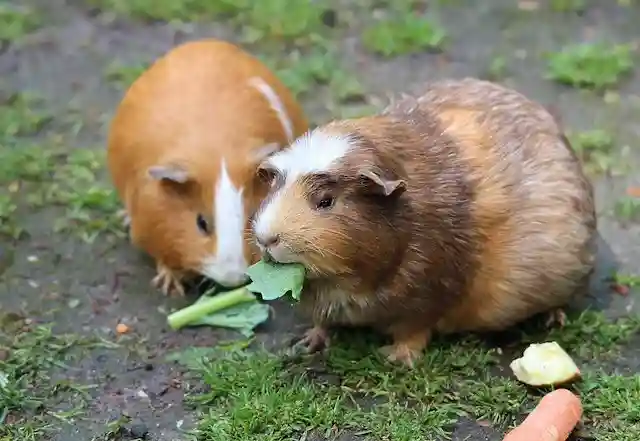Hello Everybody! Abyssinian guinea pigs, often simply called “Abyssinians,” are one of the most beloved small pets. Their distinctive rosette-patterned fur and charming personalities make them a favorite among guinea pig enthusiasts. In this comprehensive guide, we’ll delve into the world of Abyssinian guinea pigs, covering everything from their origins and characteristics to their care, health, and much more. So, if you’re considering bringing one of these delightful creatures into your life or just want to learn more, read on.
What is an Abyssinian Guinea Pig?
Abyssinian guinea pigs are a unique breed known for their striking appearance. These adorable creatures have a short, dense coat adorned with multiple rosettes or whorls of hair. Each Abyssinian sports eight to ten of these rosettes, which are arranged symmetrically across their body. Their coats can come in various colors and patterns, adding to their charm.
Origins
The exact origin of Abyssinian guinea pigs is still debated among experts. However, it’s widely believed that they are not from Abyssinia (modern-day Ethiopia), as their name might suggest. Instead, their roots likely trace back to South America, where guinea pigs were domesticated over 7,000 years ago.
Characteristics of Abyssinian Guinea Pigs
Abyssinians have some distinct physical and behavioral characteristics that set them apart from other guinea pig breeds:
| Characteristic | Description |
|---|---|
| Unique Coat Pattern | Abyssinian guinea pigs have rosettes or swirls of hair in their coat, creating a distinctive and eye-catching appearance. |
| Spirited Personalities | Abyssinians are known for their lively and energetic personalities. They are curious, playful, and enjoy exploring their surroundings. |
| Vocal Communicators | Like all guinea pigs, Abyssinians use various sounds, such as chirps, squeals, and purrs, to communicate their feelings and needs. |
| Social Creatures | These guinea pigs are highly social animals and thrive on companionship. They are happiest when they have another guinea pig friend to interact with. |
| Expressive Personalities | Abyssinians are expressive animals, and their body language can convey their emotions and moods, making them fun to observe. |
| Active Lifestyle | They are active and require plenty of space to exercise. Providing a spacious cage and daily playtime is essential for their well-being. |
| Cuddly and Affectionate | Abyssinians enjoy cuddling and bonding with their owners. They can form strong and affectionate relationships with their human companions. |
| Need for Grooming | Due to their unique coat, Abyssinians require regular grooming to prevent matting and discomfort. Brushing their fur gently is essential. |
| Playful and Inquisitive | These guinea pigs have a natural curiosity and love to investigate their surroundings, making playtime and enrichment activities essential. |
| Bond with Cage Mates | They form close bonds with their cagemates and are often happier when kept with another guinea pig for companionship. |
Unique Coat Pattern: As mentioned earlier, Abyssinian guinea pigs are known for their striking coat pattern, characterized by rosettes or swirls of hair. This unique feature makes them easily recognizable and highly sought-after among guinea pig enthusiasts.
Spirited Personalities: Abyssinians are renowned for their lively and spirited personalities. They are curious, active, and enjoy exploring their surroundings. Expect your Abyssinian guinea pig to be a bundle of energy!
Vocal Communicators: Like all guinea pigs, Abyssinians are vocal communicators. They use a variety of sounds, including chirps, squeals, and purrs, to express their feelings and needs.
Social Creatures: These guinea pigs are highly social animals and thrive on companionship. Consider getting them a same-sex cage mate for a happy and well-adjusted pet.
Abyssinian Guinea Pig Care

Housing Abyssinian guinea pigs
Provide a spacious and secure cage with plenty of room for your guinea pig to move around. Ensure good ventilation, and keep the cage clean.
Cage Size and Style:
- Spaciousness: Guinea pigs, including Abyssinians, need ample space to move around. The minimum cage size for one Abyssinian guinea pig should be around 7.5 square feet (0.7 square meters). If you have more than one guinea pig, you’ll need a larger cage to accommodate them comfortably. Bigger is always better when it comes to guinea pig cages.
- Multi-Level Cages: Consider providing a multi-level cage to maximize space vertically. Guinea pigs enjoy climbing ramps and exploring different levels of their enclosure.
- Cage Material: Opt for a cage with a solid bottom, as wire-bottom cages can cause foot injuries. Ensure that the cage is made of safe and non-toxic materials.
Ventilation and Location:
- Good Ventilation: Proper ventilation is essential to maintaining air quality in the cage. Ensure that the cage has good airflow, but avoid placing it in drafty areas.
- Avoid Direct Sunlight: Guinea pigs are sensitive to temperature extremes, so position the cage away from direct sunlight or extreme heat sources.
Bedding and Substrate:
- Bedding: Line the cage floor with appropriate bedding material. Aspen wood shavings, paper-based bedding, or fleece liners are common choices. Avoid cedar and pine shavings, as the oils they release can be harmful to guinea pigs.
- Spot Cleaning: Spot cleans the cage daily by removing soiled bedding and droppings to maintain cleanliness.
Hideouts and Enrichment:
- Hideouts: Provide hideouts or small shelters in the cage where your Abyssinian guinea pig can retreat for privacy and security. These hideouts can be as simple as wooden houses or tunnels.
- Toys and Enrichment: Guinea pigs are curious and enjoy mental stimulation. Offer toys such as tunnels, chew toys, and cardboard boxes for them to explore and play with. Rotating toys and adding new ones periodically keeps their environment interesting.
Social Needs:
- Companionship: Abyssinian guinea pigs are social creatures and thrive when they have a companion. Consider getting at least two guinea pigs of the same sex to prevent loneliness and provide social interaction.
Cleaning and Maintenance:
- Regular Cleaning: Clean the entire cage thoroughly at least once a week. Remove all bedding, wash the cage, and replace it with fresh bedding. This helps maintain hygiene and prevents odors.
- Food and Water: Provide fresh food and clean water daily. Guinea pigs are messy eaters, so their food and water dishes may need frequent cleaning.
Abyssinian guinea pigs’ Diet
A well-balanced diet is vital. Feed them a diet rich in fresh hay, fresh vegetables, and high-quality guinea pig pellets. Freshwater should always be available.

Hay:
Foundation of the Diet: High-quality hay, such as Timothy hay, should make up the majority of your Abyssinian guinea pig’s diet. Hay is essential for dental health, digestion, and it provides essential fiber.
Unlimited Access: Guinea pigs should have unlimited access to hay at all times. Ensure that the hay is clean, dry, and free of mold or contaminants.
Pellets:
Quality Pellets: Choose high-quality guinea pig pellets that are specifically formulated for guinea pigs. Avoid generic or mixed small animal pellets.
Moderate Portions: Pellets should be a supplementary part of the diet, not the primary source of nutrition. Provide a small amount (approximately 1/8 cup per day) to prevent overfeeding.
Fresh Vegetables:
Variety: Guinea pigs enjoy a variety of fresh vegetables. Include leafy greens like romaine lettuce, kale, spinach, and cilantro. Bell peppers, cucumber, and carrots are also good options.
Moderation: Introduce new vegetables gradually to avoid digestive upset. Limit the amount to about 1 cup of fresh vegetables per guinea pig per day.
Avoid Toxic Foods: Some foods are toxic to guinea pigs, including iceberg lettuce, potatoes, and onions. Make sure to research before introducing new vegetables.
Fruits:
Occasional Treat: Fruits should be considered an occasional treat due to their high sugar content. Provide small pieces of fruits like apples, strawberries, and oranges as an infrequent treat.
Fresh Water:
Clean and Accessible: Guinea pigs should have access to fresh, clean water at all times. Use a water bottle or a heavy, spill-proof bowl to ensure they stay hydrated.
Vitamin C:
Crucial Nutrient: Guinea pigs, including Abyssinians, cannot synthesize vitamin C on their own, so they need it in their diet. Fresh vegetables like bell peppers and kale are excellent sources of vitamin C.
Avoid Commercial Treats:
Be Cautious: Many commercial guinea pig treats are high in sugar and not nutritionally balanced. Limit the use of these treats and opt for healthier options like fresh vegetables.
Portion Control:
Prevent Overfeeding: Guinea pigs are prone to obesity, which can lead to health issues. Carefully monitor their portions and adjust their diet if they start gaining too much weight.
Food Presentation:
Variety and Enrichment: Present food in different ways to provide mental stimulation. For example, hide vegetables in a paper towel roll or scatter them around the cage for foraging.
Monitor Health:
Observe Eating Habits: Pay attention to your guinea pig’s eating habits. Any sudden changes, such as a loss of appetite or difficulty eating, should be promptly addressed with a veterinarian.
Abyssinian guinea pigs Grooming
Abyssinian guinea pigs require regular grooming due to their unique coat. Brush their fur gently to prevent matting and discomfort.
Grooming is an essential aspect of caring for an Abyssinian guinea pig. While these guinea pigs have distinctive and attractive coats, their unique fur pattern requires regular maintenance to keep them healthy and comfortable. Here’s a closer look at grooming for Abyssinian guinea pigs:
Brushing:
- Frequency: Abyssinian guinea pigs need regular brushing to prevent their fur from matting. Aim for at least a few minutes of gentle brushing every few days.
- Use a Soft Brush: Use a soft-bristle brush or a guinea pig-specific brush to avoid damaging their sensitive skin.
- Gentle Approach: Be gentle when brushing the rosettes and swirls in their fur, as these areas are prone to tangling. Take your time to carefully work through any knots or mats.
Bathing:
- Occasional Baths: While guinea pigs are generally clean animals and do not require frequent baths, occasional baths may be necessary if they become soiled or develop skin issues. Consult with a veterinarian before bathing your guinea pig.
- Use Guinea Pig-Specific Shampoo: If a bath is needed, use a guinea pig-specific shampoo that is gentle and formulated for small animals. Avoid using human or dog/cat shampoos, as they can be harsh on their sensitive skin.
- Thorough Drying: After a bath, make sure to thoroughly dry your guinea pig with a soft towel or a low-heat hairdryer to prevent chilling.
Nail Trimming:
- Regular Nail Checks: Check your Abyssinian guinea pig’s nails regularly. If their nails become too long, it can lead to discomfort and mobility issues.
- Use Guinea Pig Nail Clippers: Use guinea pig-specific nail clippers to trim their nails. Be cautious not to cut too close to the quick, which can cause bleeding.
Ear Cleaning:
- Inspect the Ears: Periodically check your guinea pig’s ears for signs of dirt or wax buildup. If you notice excessive dirt or discharge, consult with a veterinarian.
- Gentle Cleaning: If cleaning is necessary, use a soft, damp cloth or a cotton ball to gently clean the ears. Avoid inserting anything into the ear canal.
Eye Cleaning:
- Eye Discharge: Guinea pigs can sometimes develop eye discharge. If you notice crustiness or discharge around their eyes, consult with a veterinarian for guidance on cleaning and treatment.
Dental Health:
- Proper Diet: Providing a diet rich in hay and safe chew toys helps wear down their teeth naturally and supports dental health.
- Regular Veterinary Check-Ups: Schedule regular veterinary check-ups to monitor their dental health. Dental issues can be common in guinea pigs, including Abyssinians.
Exercise and Playtime: These energetic guinea pigs need daily exercise and mental stimulation. Create a safe play area outside the cage and provide toys for enrichment.
Breeding Abyssinian Guinea Pigs
- Pair Selection: Choose a healthy and genetically diverse male (boar) and female (sow) Abyssinian guinea pig for breeding. Ensure they are at least 4-6 months old and in prime health.
- Compatibility: Guinea pigs are social animals, but not all pairs get along well for breeding. Introduce them gradually and monitor their interactions to ensure they are compatible.
- Breeding Environment: Place the male and female together in a neutral and spacious enclosure when you are ready for them to mate. Remove any potential sources of stress or aggression.
- Observation: Allow the male and female to interact and mate naturally. It’s best to observe them closely to ensure successful mating and avoid any aggressive behavior.
- Pregnancy: Abyssinian guinea pig pregnancies last approximately 59-72 days. After successful mating, the female will exhibit signs of pregnancy, including weight gain and an increasingly round abdomen.
- Nesting: As the due date approaches, provide a comfortable nesting box with appropriate bedding material for the pregnant sow to give birth and nurse her pups.
- Pregnancy Care: Ensure that the pregnant sow continues to receive a balanced diet with extra nutrients to support her health and the health of the developing pups. Consult with a veterinarian for specific dietary recommendations.
- Weaning: After the pups are born, monitor their growth and well-being. Guinea pig pups typically start nibbling on solid food within a few days, but they will still nurse from their mother. Weaning usually occurs around 3-4 weeks of age.
- Separation: To prevent further mating, separate the male from the female and the pups once the pups are weaned. This will help avoid stress and any potential harm to the pups.
- Social Interaction: Guinea pigs are social animals, so maintain social interactions with both the parent guinea pigs and the pups to ensure their well-being.
- Responsible Ownership: Consider the responsibilities associated with breeding, including finding suitable homes for the offspring, and only breed if you can provide for the well-being of the guinea pigs and their offspring.
- Spaying/Neutering: If you do not intend to breed guinea pigs or cannot responsibly care for the offspring, consider spaying or neutering your guinea pigs to prevent unplanned pregnancies.
Common Health Issues of Abyssinian guinea pigs
Like all pets, Abyssinian guinea pigs can face health issues. Regular veterinary check-ups are vital. Common health concerns include:
Dental Problems: Guinea pigs’ teeth continuously grow, so dental issues can arise. Ensure they have access to chew toys and hay to help wear down their teeth naturally.
Respiratory Infections: Abyssinians are prone to respiratory issues. Keep their living environment clean and free from drafts to reduce the risk.
Skin Problems: Their unique coat can make them susceptible to skin problems, so be vigilant for signs of irritation or parasites.
Are Abyssinian Guinea Pigs Friendly?
Abyssinian guinea pigs are known for their friendly and social nature. They are generally affectionate and enjoy interacting with their owners. However, their level of friendliness can vary from one individual to another, so it’s essential to spend time with your Abyssinian guinea pig to build trust and a strong bond.
Is Abyssinian Guinea Pig Rare?
Abyssinian guinea pigs are not considered rare in the world of guinea pig breeds. They are quite popular among guinea pig enthusiasts due to their unique and attractive coat pattern. You can typically find Abyssinian guinea pigs in pet stores and from reputable breeders.
Do Abyssinian Guinea Pigs Live Longer?
The average lifespan of an Abyssinian guinea pig is typically 5 to 7 years. With proper care, some may live even longer. Providing a balanced diet, a clean and spacious living environment, regular veterinary check-ups, and companionship can contribute to a longer and healthier life for your Abyssinian guinea pig.
Are Abyssinian Guinea Pigs High Maintenance?
Abyssinian guinea pigs do require some additional grooming compared to other guinea pig breeds due to their unique coat. Regular brushing is essential to prevent matting and discomfort. Additionally, they need a clean and spacious cage, a balanced diet, and daily exercise and playtime. While they may require a bit more attention to their grooming, they are not excessively high-maintenance pets and can make wonderful companions with proper care.
How Do I Know if My Guinea Pig is Abyssinian?
Identifying an Abyssinian guinea pig is relatively easy due to its distinctive coat pattern. Abyssinian guinea pigs have multiple rosettes or swirls of hair on their body. These rosettes are arranged symmetrically and create a unique and recognizable appearance. When you observe your guinea pig, you’ll notice these rosettes, which can vary in number and size. The rosettes are the key characteristic that distinguishes Abyssinians from other guinea pig breeds.
How Rare Are Abyssinian Guinea Pigs?
Abyssinian guinea pigs are not considered rare in the world of guinea pig breeds. They are quite popular and widely available in pet stores and through reputable breeders. Their distinctive appearance and friendly personalities make them a sought-after choice among guinea pig enthusiasts. You should be able to find Abyssinian guinea pigs with relative ease if you’re interested in adopting one as a pet.
What Is the Standard for Abyssinian Cavy Breed?
The American Cavy Breeders Association (ACBA)1 has established specific standards for various guinea pig breeds, including the Abyssinian. These standards outline the desired characteristics for show-quality Abyssinians. Some of the key criteria include the number and symmetry of rosettes, the density and texture of the coat, and the overall body shape and size. Breeders and exhibitors refer to these standards when breeding and showing Abyssinian guinea pigs to ensure they meet the recognized criteria.
Conclusion
Abyssinian guinea pigs are delightful, unique pets that bring joy to many households. Their distinctive appearance and spirited personalities make them a fantastic addition to any family. By providing proper care and attention to their needs, you can enjoy the companionship of these charming little creatures for years to come.
Abyssinian Guinea Pig FAQs
Are Abyssinian guinea pigs suitable for children?
Yes, Abyssinian guinea pigs are generally good pets for children. However, supervision and gentle handling are essential to ensure both the pet’s and the child’s safety.
How long do Abyssinian guinea pigs live?
On average, Abyssinian guinea pigs live for 5 to 7 years. Proper care and a healthy diet can extend their lifespan.
Can Abyssinian guinea pigs be kept alone?
While guinea pigs are social animals, it’s best to keep Abyssinians in pairs or small groups to prevent loneliness and depression.
Do Abyssinian guinea pigs require special grooming?
Yes, their unique coat does require more grooming than other guinea pig breeds. Regular brushing helps prevent matting and discomfort.
Are Abyssinian guinea pigs prone to any specific health issues?
As mentioned earlier, they can be susceptible to dental, respiratory, and skin problems. Regular veterinary care and a clean living environment can help prevent these issues.
How do I introduce two Abyssinian guinea pigs to each other?
Introducing guinea pigs should be done gradually and in a neutral space. Supervise their interactions to ensure they get along.
References & Footnotes
Disclaimer
“As an Amazon Associate, we earn from qualifying purchases where there is no additional cost to you. This is one way to support us.” The products displayed here are well-researched, highly rated by users, and fast-moving.






